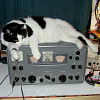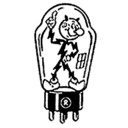What is the difference between Carbon Film and Carbon Comp resistors. I usually buy my resistors from a surplus shop, so they are not labeled. I ordered the MF resistors I have in there now. Why are MF no good in the grid stopper position?
BTW, I have two of these preamps. One with the MF and one with the surplus resistors and there is very little hiss difference in them. I do not own another amp with a lower gain stage really. Maybe I need to take it to someone's house with a different amp/speakers.
Thanks,
Blair
12AU7 bias?
21 posts
• Page 2 of 2 • 1, 2
Carbon Composition (CC) resistors have a central core of carbon material with insulation around it, sort of like a pencil. Carbon film (CF) and Metal Film (MF) have a ceramic core with vapor deposited carbon or metal on the outside. The film is made thinner or thicker depending on the resistance desired and is fine tuned with laser etching and then coated.
CC resistors almost always are more cylindrical shaped since they are molded.
The problem with the film resistors can be their response to pulse currents.
Since the film is very thin its possible to burn it up before the heat can be absorbed by the ceramic substrate. A carbon comp resistor on the other hand has much more thermal mass and is not as easily damaged.
CC resistors almost always are more cylindrical shaped since they are molded.
The problem with the film resistors can be their response to pulse currents.
Since the film is very thin its possible to burn it up before the heat can be absorbed by the ceramic substrate. A carbon comp resistor on the other hand has much more thermal mass and is not as easily damaged.
Mike's N-1 Rule: When looking for N number of components to finish a job, you have a 95% chance of only finding N-1 of them.
-

mesherm - KT88
- Posts: 1232
- Joined: Fri Aug 27, 2004 10:33 pm
- Location: Alvin Texas
Someone forgot to mention metal oxide - they sound good, handle extreme pulses and are non-inductive :-)
Cheers!
Cheers!
-= Gregg =-
Fine wine comes in glass bottles, not plastic sacks. Therefore the finer electrons are also found in glass bottles.
Fine wine comes in glass bottles, not plastic sacks. Therefore the finer electrons are also found in glass bottles.
-

Geek - KT88
- Posts: 3585
- Joined: Sun Oct 21, 2007 3:01 am
- Location: Chilliwack, British Columbia
Geek wrote:Someone forgot to mention metal oxide - they sound good, handle extreme pulses and are non-inductive :-)
Cheers!
aka 'Flameproof' resistors ?
One of my faves, though not very compact- smallest I have is 1W.
Sometimes a bigger resistor with longer leads is good when doing p2p.
- VictoriaGuy
- Posts: 8
- Joined: Tue Jul 19, 2011 6:24 pm
These are the ones I love:
http://search.digikey.com/scripts/DkSea ... 0KW-1BK-ND
Though they only go to 100k, then I use the 1 or 2W Yageo fellas:
http://search.digikey.com/scripts/DkSea ... 470KW-1-ND
I've used 1W and 2W with no difference in performance... even on phono stages, the 2W will be quieter than a carbon film (though I love the warm tone of the carbon film).
Cheers!
http://search.digikey.com/scripts/DkSea ... 0KW-1BK-ND
Though they only go to 100k, then I use the 1 or 2W Yageo fellas:
http://search.digikey.com/scripts/DkSea ... 470KW-1-ND
I've used 1W and 2W with no difference in performance... even on phono stages, the 2W will be quieter than a carbon film (though I love the warm tone of the carbon film).
Cheers!
-= Gregg =-
Fine wine comes in glass bottles, not plastic sacks. Therefore the finer electrons are also found in glass bottles.
Fine wine comes in glass bottles, not plastic sacks. Therefore the finer electrons are also found in glass bottles.
-

Geek - KT88
- Posts: 3585
- Joined: Sun Oct 21, 2007 3:01 am
- Location: Chilliwack, British Columbia
MF resistors will work for grid stoppers (even though they are slightly indcitive), CCs are non-inductive, as they consist of a plug of a carbon powder mix, packed in between the two end leads.
CCs, especially the smaller 1/4 watters, can be adversely affected by too much heat being applied, when soldering, either the resistance value can go way out of spec, or the resistor body can soften, and the lead can lose connection inside the resistor, or even pull itself out of the resistor. (been there, done that, especially if I try to keep the resistor leads real short)
One major hazard with carbon composition resistors (especially if they are about 50 years old) is that they can absorb moisture from the air, and drift significantly from their designed value, far beyond their 10% or 5% tolerances. So that 10K resistor could actually become 7K or 15K
A few years ago, I bought a large ziplock "freezer bag" stuffed full with NOS CC resistors, in 1/2, 1 and 2 watt sizes, but unfortunately, most were well out of tolerance, with both excessively high and excessively low resistance . I figure they probably spent about 50 years stored in some dank and musty NH cellar, barn or attic, .. It only cost me a buck or two for them,, so no big deal, and I still have them around - I thought of sometime trying to " slow-bake" them at around 120-150 degrees F, and see if they would return to their normal values.
deal, and I still have them around - I thought of sometime trying to " slow-bake" them at around 120-150 degrees F, and see if they would return to their normal values. 

I use the 2 or 3 watt metal oxides for cathode resistors, when 5 or 10 watt WWs would be an unnecessary "overkill". These MO's are good with EL84s, 6GK6s, 6S4As, 12B4As and 1626s, though 2W would be a bit too small for the bigger power tubes. I've also used them for plate resistors when a half or a one watter just isn't quite enough.
/ed B
CCs, especially the smaller 1/4 watters, can be adversely affected by too much heat being applied, when soldering, either the resistance value can go way out of spec, or the resistor body can soften, and the lead can lose connection inside the resistor, or even pull itself out of the resistor. (been there, done that, especially if I try to keep the resistor leads real short)
One major hazard with carbon composition resistors (especially if they are about 50 years old) is that they can absorb moisture from the air, and drift significantly from their designed value, far beyond their 10% or 5% tolerances. So that 10K resistor could actually become 7K or 15K

A few years ago, I bought a large ziplock "freezer bag" stuffed full with NOS CC resistors, in 1/2, 1 and 2 watt sizes, but unfortunately, most were well out of tolerance, with both excessively high and excessively low resistance . I figure they probably spent about 50 years stored in some dank and musty NH cellar, barn or attic, .. It only cost me a buck or two for them,, so no big
 deal, and I still have them around - I thought of sometime trying to " slow-bake" them at around 120-150 degrees F, and see if they would return to their normal values.
deal, and I still have them around - I thought of sometime trying to " slow-bake" them at around 120-150 degrees F, and see if they would return to their normal values. 

I use the 2 or 3 watt metal oxides for cathode resistors, when 5 or 10 watt WWs would be an unnecessary "overkill". These MO's are good with EL84s, 6GK6s, 6S4As, 12B4As and 1626s, though 2W would be a bit too small for the bigger power tubes. I've also used them for plate resistors when a half or a one watter just isn't quite enough.
/ed B
Real Radios Glow in the Dark
-

EWBrown - Insulator & Iron Magnate
- Posts: 6389
- Joined: Wed Mar 19, 2003 6:03 am
- Location: Now located in Clay County, NC !
21 posts
• Page 2 of 2 • 1, 2
Who is online
Users browsing this forum: No registered users and 6 guests
